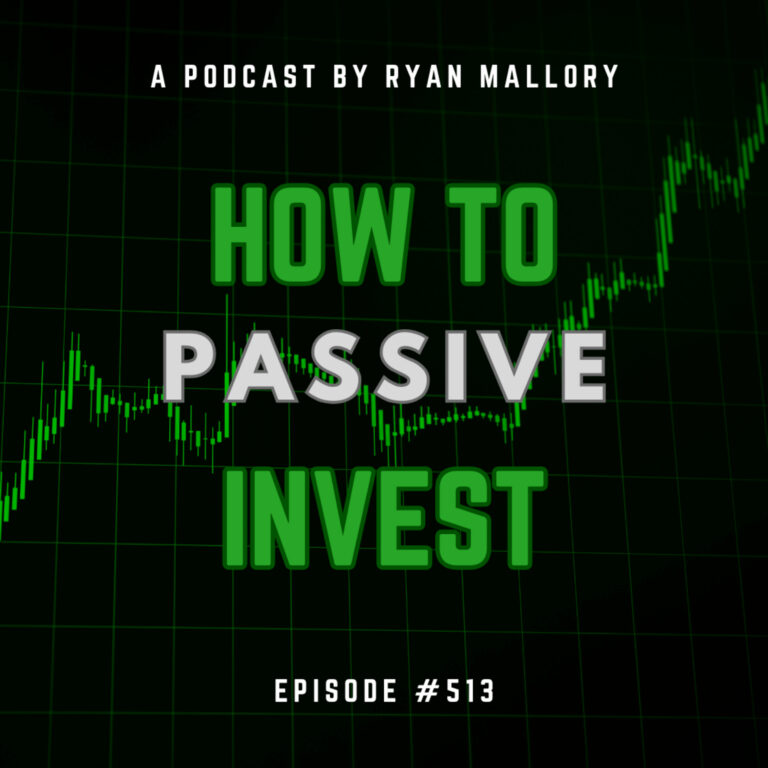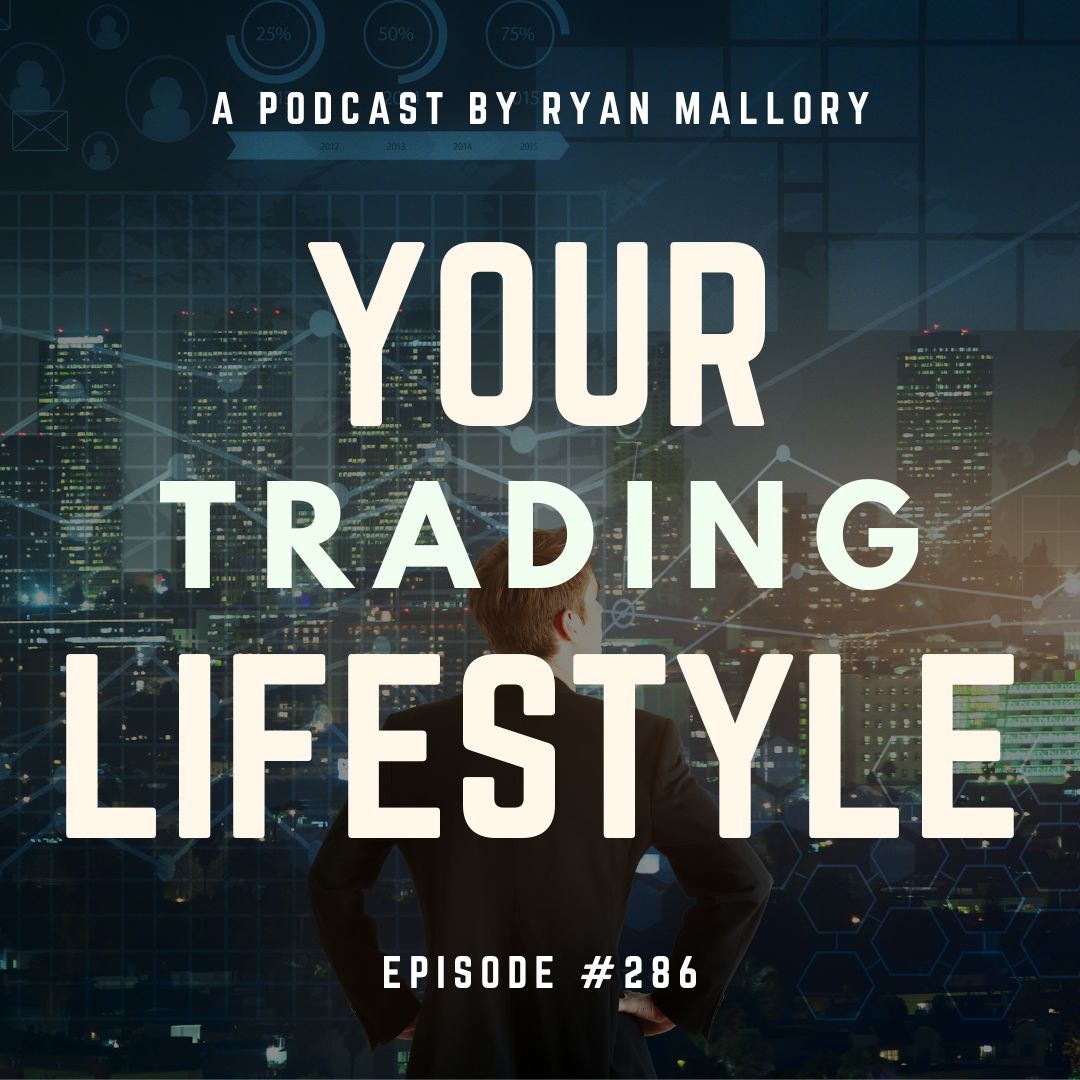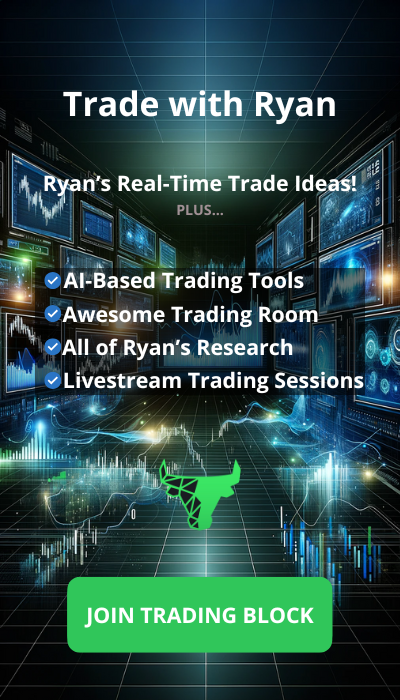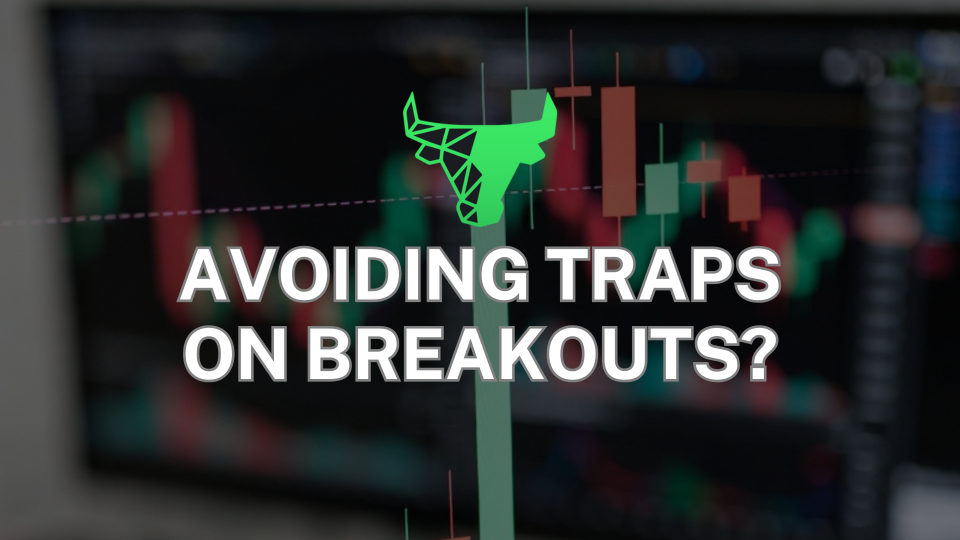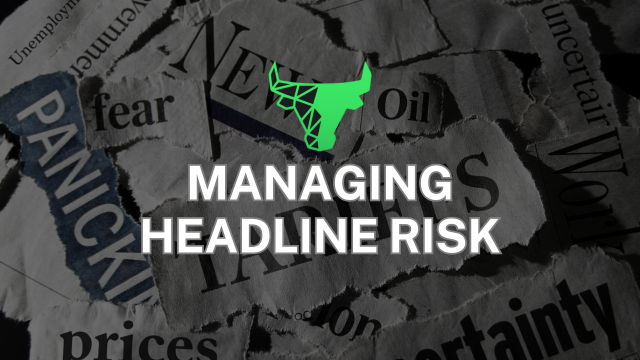Episode Overview
What are some of the basic requirements to becoming a full-time trader, and why it is important to have a side hustle to take advantage of? In this episode, Ryan details the financial aspect of trading, as well as the unexpected when it comes to full-time trading, not to mention some life hacks to take advantage of.
Available on: Apple Podcasts | Spotify | Amazon | YouTube
Episode Highlights & Timestamps
- [0:33] Transitioning into Full-Time Trading
Ryan introduces the topic and discusses what expectations and planning are necessary to make trading a full-time career. - [1:09] A Listener Named “Nancy” Shares His Journey
A trader in his mid-20s asks Ryan when he knew he had the capital and confidence to go full time. - [4:29] Learning the Hard Way from a $16,000 Gain
Ryan reflects on Nancy’s early trading mistake of letting large profits evaporate and relates it to the discipline of locking in gains. - [10:06] What It Really Takes to Trade Full-Time
Ryan shares the mindset and financial planning needed before transitioning into full-time trading and emphasizes building additional skills or side income. - [14:12] Swing Trading vs. Day Trading
Ryan compares the two approaches, warning about the traps of day trading and emphasizing the benefits and flexibility of swing trading.
Key Takeaways from This Episode:
- Take Profits When You Can: Holding for the perfect exit can cause major gains to disappear. Consistently taking partial profits protects your portfolio.
- Build Experience and Confidence Over Time: With years to prepare, focus on developing both trading skill and financial reserves before going full-time.
- Have a Side Hustle: Full-time trading can be slow. Supplementing with a side gig provides income and mental balance during inactive trading periods.
- Swing Trading Encourages Patience: Unlike day trading, swing trading gives you time to wait for ideal setups without the pressure to act every day.
- Smart Doesn’t Equal Successful: Highly educated professionals often struggle with trading because they overestimate their ability to outthink the market.
Resources & Links Mentioned:
- Swing Trading the Stock Market – Daily market analysis, trade setups, and insights by Ryan Mallory.
- Join the SharePlanner Trading Block – Get real-time trade alerts and community support.

Take the Next Step:
✅ Stay Connected: Subscribe to Ryan’s newsletter to get free access to Ryan’s Swing Trading Resource Library, along with receiving actionable swing trading strategies and risk management tips delivered straight to your inbox.
📈 Level Up Your Trading: Ready for structured training? Enroll in Ryan’s Swing Trading Mastery Course, The Self-Made Trader, and get the complete trading course, from the foundational elements of trading to advanced setups and profitable strategies.
📲 Join the Trading Community: Sign up for SharePlanner’s Trading Block to become part of Ryan’s swing-trading community, which includes all of Ryan’s real-time swing trades and live market analysis.
Full Episode Transcript
Click here to read the full transcript
0:07
Hey, I’m Ryan Mallory and this is my swing trading the stock market podcast. I’m here to teach you how to trade in a complex ever-changing, world of Finance, learn what it means to trade, profitably and consistently managing risk, avoiding the pitfalls of trading. And most importantly, to let those winners run wild, you can succeed at the stock market and I’m ready to show you how, hey, everybody, this is Ryan Mallory with swing trading the stock market.
0:33
In today’s episode will be a good one. We’re going to talk about transitioning into full-time trading. What kind of salary do you need? What kind of expectations should you have to know? Hey, I can do this or I got enough money to be able to backstop me in case something doesn’t go right.
0:49
We’re going to talk about that in this email from a guy who wants to be named after the greatest trader of our time. None other than the one and only Nancy Pelosi. So Nancy rights Hey, Ryan. My name is Nancy and I know that you like to give good redneck names, but could you name me after the greatest trader of all time?
1:09
Nancy Pelosi. If not, I understand, no, we were definitely going with Nancy, buddy, like everyone else. I’ve been listening to your podcast for quite some time, and now, I’m a member of the trading block, a little background, is that? I’m in my mid 20s, and have been trading. Since I was 18. I have had a lot of ups and downs in my trading career, and I made a lot of mistakes.
1:27
My first big one was my second trailer I ever made which was on a penny stock that went to the moon and he puts It’s went to the moon and quotes, I need that being up a little over 16 thousand dollars. In kept holding man, I would love to know what that stock only to have the moon come Crashing Down to Earth that losing all the prophets.
1:43
And then some, I had that happened to me a couple more times before I took a step back and started doing more research and making smarter decisions, mostly thanks to your podcast, I have about 10 more years in my current career field. Before I move on to something else and being a full-time part-time Trader has always been of interest to me my question.
2:02
Is a speaker of the house. Not just kidding. He did not write that. My question is, at which point did you believe that you had enough capital and experience / confidence, built up to sustain your current and future lifestyle and take on trading full-time.
2:19
Now, I’m not asking for any specific numbers but maybe in terms of a yearly salary if it applies big, thanks for all the information that you’ve given me through your podcast. It’s helped me tremendously sincerely. Nancy. Well Nancy, we’re going to answer your question.
2:36
But first off, what am I drinking? I’ve got Baker’s number seven. I was a Navy. See the other day and I found some welders there that was pretty cool because it’s only like 20 something dollars a bottle for welders. And while there’s is pretty tasty, one of my wife’s favorites by the way, but then this guy says, hey, we got this Baker 7 at last for, like a day.
2:56
It’s from the Jim Beam. Distillery 107 proof which makes it about fifty three and a half percent alcohol. It says people. I love this stuff. So I said okay about $60. I mean it’s kind of getting up there. What the heck? I’ll do it. So I bought it. Beautiful bottle, really cool bottle color on this thing looks pretty good.
3:14
Just kind of like a nice solid brown color like a Grizzly. Brown color to the nose. Smells like a little bit, like a leather jacket. Kind of, I mean, nice little leather smell. I can also smell some serious butterscotch at this thing. And then to The Taste, the taste has a nice, like peppery flavor.
3:32
It’s It’s got some nutmeg is not bad and then on the Finish, it’s very complementary to the rest of the flavors that you just like tasted and smelled, you get a little bit of a spice, it’s very flavorful. And again, you kind of like pick up on some of those like leathery type notes So Not a Bad Bourbon at all.
3:49
I mean I feel like $60 isn’t bad for the bourbon, it’s Justified. I give it an eight point, one really good flavor overall. I like it. What I consider to Everyday Supreme? Haven’t been talking about everyday sippers, probably, not at the Sixty dollar Mark, I feel like that. Could start running up a bill for a weekend zipper.
4:06
Absolutely. Weekend sipper is the perfect weekend sipper, man, Friday night. You had a couple of good trades throughout the week. Yeah, let’s step on some Baker’s Seven. Special occasions, maybe yeah, yeah, that’s pretty good for a special occasion as well to pop the cork on. So going through the email and as you guys know, I like to dissect some of the stuff that’s not really the question in the email just to go over that as well because sometimes there’s some hidden gems in these emails that you.
4:29
All right first one from Nancy, is the fact he was up sixteen thousand dollars on a trade and it was a second trade man. I never was up no sixteen thousand dollars on a second trade or even a third or probably my first hundred geez. So the fact he was up sixteen thousand dollars on this trade and he didn’t take profits, that’s mind-blowing to me but that’s what can happen often times too when you start getting into the mindset of something going to the moon and think that hey this thing is going to make me super rich.
4:56
I’m already up 16,000. Who knows what else might happen? I mean I had a trade just yesterday I was up seven, eight percent on SSO. You know, I was playing the market bounce when it turned around following the CPI report and man I was thinking man, this is a really good start to this trade up 8%.
5:13
I didn’t want to take any profits on that trade hazard. Heck no, you know, but that’s what I’m thinking, right? Because we all want to act like we don’t have emotions and we don’t have anything that we are affected by from a personality standpoint but we do we all do. If you’re listening to this podcast I can assure you you do.
5:29
But it’s about willing to recognize what can affect our decision-making and not letting it affect our decision making. So, with SSO, like I said, I was up like eight percent, starts to come back down a little bit. It’s intraday pull back or whatever. It’ll probably bounce back in a ditch, but I didn’t want to take any profits, but I knew it was a prudent thing.
5:46
So I took like a quarter off the table and then I took another 12% off the table and by the end of the day, I had essentially took a quarter off at like six percent. I took another 12% off at 7% to lock in some gains because as good as it feels when you’re up a lot you can’t say with any kind of certainty that it’s going to continue in that direction.
6:02
Sometimes it does. But oftentimes, it doesn’t. And that’s such a disappointment when that happens. So, the next day, the market opens higher. And I’m thinking, oh man, this ETF is just continuing to rock. And then within minutes it just gave up completely all the gains.
6:18
And so I ended up taking the last two thirds out for like a four percent profit which is fine. I came away with almost 5 percent in profits on the overall trade, did fine. But was there a tendency to want to say? Hey man, I was up 8% on this one. I’m going to let it ride out until I can get my 8% back?
6:35
Yeah, there always is. But that’s the difference between really like a lot of your successful traders and non-successful traders, is that they let the past, the basically the sunk costs, the sunk decisions, the things that you can’t do anything about at this point affect their future decisions, which they can do something about. So yeah.
6:53
Would I have liked to have gotten the trade out at 8%? 100% yes. Was making 5% on the trade bad? No. 5% is great. Compared to 8%, it’s not as good. And yeah, I would like to have the 8% that I could have had, but I stayed disciplined in my trades.
7:09
I didn’t let that pullback that’s already happened affect my future decisions. I could see that bounce attempts were not doing a very good job of holding so I went ahead and got out, took the 5%. I’m happy about that 5%. It’s a good trade. A lot of times too when you’re in the trades, you don’t see it that way.
7:27
It’s kind of hurting because even though you haven’t booked those gains, it feels like they were yours at one point, which is kind of the exact opposite with losses because we always say, oh, you haven’t taken a loss unless I sell. No, that’s not always true. I mean, sometimes those losses don’t come back. A lot of times, they don’t come back.
7:43
But Nancy here, up sixteen thousand dollars second trade ever. You’d think that would be a reason to start taking some profits. Maybe takes like a third off the table at 16,000. Lets the rest ride and then it doesn’t go any higher. It starts to come back down again and then okay, he takes another third off at 12,000, he takes another third off and closes the position at 8,000. He lost half the gains on the last third of a trade, okay?
8:00
So what is he looking at now? Looking at about 12,000 dollars in gains. Now, how would the email present-day look like? Man? I had a really good trade back in the day. I was up 16,000, but instead of risking all those profits, I took a little bit off the table and it came back down. I took another third and when it came back down at 8,000, I closed out the position, but I still made twelve thousand dollars on it. It was an amazing trade, one of my best trades ever.
8:21
Totally different story at that point because now what he’s writing me about is I was up sixteen thousand dollars, I lost it all and then some. But why from 16 to 15 to 14 to 13 to 12 to 11, all the way down to zero, why is he not taking profits? Why did he not say, hey, something’s wrong with this trade?
8:37
Better to take a little bit off the table just to make sure that I come away with something. Make sure that the trade was still worth my time. Why not do that? Because he remembers where he was at before and he’s like, I got to make that money back. So that wasn’t the question that Nancy asked me about, but I just see that in so many different traders that it does kind of drive me nuts.
8:54
I’ve done it before in my career especially early on. I think I told you guys a story one time when I was up 60% on a stock because I didn’t even know there was news pending on the stock. This was one of my first trades that I ever made and I lost it all and then some as well. It wasn’t up sixteen thousand dollars. I was maybe up like a thousand or something but that was early in my trading career. I thought I knew what I was doing and then with Nancy, this happened a few more times.
9:17
I don’t know if he was up at actually 16,000 like it was before but he said he was definitely up some and then he lost those profits as well. So it was a hard habit, this person, to break. But the good thing is that he’s taking a step back, right? So he’s been doing this. He said he’s in his mid 20s. Let’s say he’s 25 years old. He started when he was 18.
9:32
And so he has about seven years of experience, that’s good. I mean, that means he’s seen a lot of things since 2015 when he first started trading and 2022. Now he’s got about seven years experience. That means he’s seen like the crazy sideways chop of 2015, he saw the 2018 sell-off, he saw the sell-off in 2020.
9:48
Now he’s seeing this one too, and he’s seen everything in between from a bull market standpoint. So he’s getting the experience, but it’s got to make it applicable to his trading account and probably one of the best things that he has going for him, is that he has about 10 more years before he has to make a decision about whether or not he wants to go into full-time trading.
10:06
It’s not like an all-or-nothing kind of a thing. It’s not a zero-sum game where it’s only trade, you can only make money as a full-time trader by trading, especially as swing traders. There’s plenty of downtime that you would have normally without a side gig. You’ll be like watching TV.
10:22
Probably because not every day you trade. I think so far this month, I’ve made two trades. It’s not that I want to make only two trades. I would like to make 30 or 40 trades, profitable ones of course. But if the market conditions aren’t warranting it, then you’re not making any trades and you’re not having to monitor anything. It can be kind of dull. So it’s good, especially in the case of Nancy here to, you know, when you’re looking to transition into the next phase of your life is to be thinking about, okay, what are some things that I could do in conjunction with trading?
10:52
You know, I do the podcast for myself and that’s one of the things that I do as part of my full-time trading. You know, I’m a full-time trader but I also do this podcast. Also do SharePlanner and I really enjoy those things. And the main reason why is because if I did not have these things in my life, there would be a lot of sitting and twiddling my thumbs.
11:13
So it’s important to have a side gig to have something to keep you interested and it doesn’t have to be financial related like what I do. It can be sewing, it can be, I don’t know. There’s just tons of things you could be doing a podcast on some other kind of a subject if you wanted to.
11:28
I mean, I think podcasting for instance is really at the early stages. Kind of like what YouTube was like in the early 2000s and a lot of people are just now starting to discover it. So if you have an area of expertise or something that you feel very good about talking about and you can offer some knowledge and wisdom, podcasting is where it’s at.
11:46
And as far as like how much capital should you have in order to become a full-time trader? I don’t know if there’s ever really a good amount that you’ll ever feel comfortable with. Because there’s risk involved in becoming a full-time trader, you’ll never get to the point to where when you’re on the brink of leaving your current career field and becoming a full-time trader to where you’ll say, okay, I feel good about this.
12:05
I’m going to go ahead and leave my job and become a full-time trader and I’m not going to worry about anything because I’ll be making the money. No, it’s never going to feel that way. There will feel like a lot of risk. It’ll feel like it’s not enough. I remember when I quit, I really thought I knew what I was doing back then and probably I didn’t completely understand what it was that I was entering into mainly because I didn’t really have anybody guiding me.
12:27
Telling me, hey, yeah, you know, by doing X Y & Z, you’ll be fine as a full-time trader. I felt like I was a pretty good trader at the time and I can sustain myself and since then I have, but the challenges that came up along the way, things that I didn’t expect to happen, that happened. For instance, I went through a divorce. You know how costly a freaking divorce is? I didn’t even see it coming.
12:46
But that’s one of those things that happen that you don’t foresee. So to be able to say, yeah, you’re going to become a full-time trader and, you know, you have X amount of dollars and you have nothing to worry about. It’s really not possible. Now, should there be a certain amount of money that you at least try to save up for?
13:02
I mean I think from a full-time trading standpoint, it’s good to have like probably a couple of years worth of salary saved up because what if you go through a bad year? What if you go through a year where it’s just very difficult? 2015 was a very difficult year of trading. It was just sideways the whole time.
13:18
It was very difficult for me to be able to make a lot of money out of the market. That’s also why it’s kind of good to have a side hustle is because it can help supplement those weeks where you don’t do too good, those months where you don’t do too good. It’s not like if you have a side hustle or if you have something on the side that you’re working on that brings in money, that somehow you’re less of a trader for that. And in case of Nancy here, has ten years before the next career move, man, that’s a great time to not only become good at as a trader but good at something else too to where hey, maybe I can do some carpentry at the house, I have all the space in the garage and maybe I can, you know, start making some tables and sell some furniture on the side.
13:55
That would be pretty cool, right? Because there is downtime as a swing trader. Now day trading, a lot of people want to become a day trader. Well, for one that takes a lot of laser focus. You’re looking at a screen for about six and a half hours. You’re probably peeing in a bottle and you’re not getting much of a break in between them. For me, that’s probably not the best case.
14:12
I like to get up. I like to move around a little bit. Take my eyes off the screen some when I know I don’t have to necessarily be looking at the screens at that very moment. But day trading, there’s like this need to have to trade because it’s day trading. You got to find something every day to trade.
14:29
That’s typically the case. If there’s a move, you feel compelled to be in it. Swing trading, if there’s a move, you don’t necessarily have to jump in on that move. There’s been plenty of moves just this month alone that I have not been a part of and I’ve been glad that I haven’t been a part of it. But as day traders, you feel that you have to take a move every day.
14:45
If there’s a stock that’s running high, you’ve got to get into that stock and day trading focuses more, I feel like, on the quantity of trades that you’re making and hoping that the net sum is profitable rather than the quality. A lot of the trades that most of your day traders take are not that good.
15:00
There’s this Facebook group that I’m a part of. I don’t even know how I became a part of it. I just happened to stumble across it and it’s like that leveraged ETFs man, people are blowing up their account every day in the things that they say are absolutely stupid. And if I try to like say something to correct them on, it blows me off acting like I have no idea what the heck I’m talking about. But I get it.
15:15
You know, that person’s been trading for six months, I’ve only been doing it for 30 years but these people, they feel the need to trade. They feel like they need to make every move. They have to have these feelings when it comes to their trading too. I think a lot of times traders go with feelings. Oh, I think we’ll reverse. I feel like we’re going to fade at the end of the day and then it doesn’t and intraday price action is much less reliable than daily price movement and swing trading can take much more advantage of a daily chart candle than a day trader can because you can hold the trades for multiple days whereas a day trader really has to rely on like one and five minute charts.
15:48
It’s even hard to follow like a 30-minute or an hourly candle for a day trader. And so the more zoomed in you go on the candles where you’re trading, like 1 and 5 minute candles instead of daily or weekly candles, the less reliable those candles are going to be. There’s much more noise in the price action.
16:05
And for the most part, I’ve rarely come across good day traders. I’ve come across good swing traders, but rarely rarely do I come across a good day trader. I can’t even really name any. That’s how few and far between that they are. So to me, if you’re going to become a day trader, become a good swing trader at first, and you might find that as a good swing trader, you have no interest in becoming a day trader. But a lot of people look at the day trading and they say, well I can day trade and make $200 a day, and I’ll be fine.
16:32
Swing trading, you don’t know if it’s going to take a couple of weeks or a couple days to maybe get, you know, two or three hundred bucks off of that trade, but it’s better to make that one trade, get a $300 in profits off of that one trade than to day trade for two weeks in a row and have a hundred dollar deficit, is it not?
16:49
And don’t think that you can become a day trader because you’re smarter than the market or that you can outthink the market or that you can be a logical person that can get you through, you know, tough environments. Market really penalizes smarts, I’m telling you. I think some of the worst traders are typically your doctors and your lawyers and your scientists. They’re just not that good.
17:09
And the reason why is because they’re so smart, they think that they can outsmart the market and the market usually destroys them for that. The other thing too, you know, when you become a full-time trader is that patience becomes even more critical. For me as a full-time trader, I can’t afford to mess up because this is my job.
17:25
I’m messing up my career if I mess up at my trading. As a part-time trader, yeah, you can always back that with a paycheck and start all over again. A lot of people do that. But one of the key ingredients as a swing trader is patience. I’ve been harping on that a lot over the last few podcasts.
17:41
Patience pays. And as day traders, you almost feel like you need instant results. Like, you have to trade that day no matter what the market’s doing, and you get whiplashed all over the place. And if you had just shown a little bit of patience and said, hey, tape’s not that friendly today. I’m going to go ahead and step out, you’d be much better.
17:58
There’s not a need to act right away with swing trading. Day trading there is. And I can really come back to where most traders, one of the things that does help traders is swingtradingthestockmarket.com. Let me tell you about swingtradingthestockmarket.com. You’re gonna get all my market research each and every day.
18:17
Every day, you’re going to get video sent to you. It’s going to include updates on the market. It’s going to include updates on all your big tech stocks, plus the stocks that I’m looking at with stocks on the radar or potential trade setups, plus my weekly watchlist. Guys, this is some good solid stuff. Check it out, swingtradingthestockmarket.com and you’re supporting this podcast as a result now.
18:40
And yeah, what I think is important is that as traders, we just don’t go, you know, transitioning from one career field to full-time trading all willy-nilly. It is hard. It’s difficult. There’s going to be things that you encounter that you never expected. I don’t think it’s good to go full-time into day trading before you become an expert trader at swing trading.
19:00
And like I said, by the time you become really good at swing trading, you’re probably going to be like I don’t know if I really care about becoming a day trader. I’m doing fine at swing trading. And remember guys, you don’t have to be just trading and only trading. There’s nothing wrong with having a side hustle.
19:16
Nobody really talks about that because they feel like it’s like your badge of honor if that’s the only thing you do is being a full-time trader. It’s not. There’s plenty of time as a swing trader to have a side hustle. Just make it conducive to your trading. You enjoyed this podcast.
19:35
I would encourage you to leave a five star review on whatever platform you’re listening to. It helps me out quite a bit and continues to allow me to provide you with these great episodes each and every week. I usually try to do two a week and keep supporting SwingTradingTheStockMarket.com, and send me your emails ryan@shareplanner.com. Man.
19:51
I read your questions just like I did from Nancy here and I try to make an episode out of every one of them. So keep them coming. Thank you guys. And God bless. Thanks for listening to my podcast. Swing Trading the Stock Market. I’d like to encourage you to join me in the SharePlanner Trading Block where I navigate the stock market.
20:09
Each day with traders from around the world. With your membership, you will get a 7-Day trial and access to my trading room including alerts via text, email and WhatsApp. So go ahead to sign up by going to SharePlanner.com/tradingblock. That’s www.shareplanner.com/trading-block.
20:26
And follow me on SharePlanner’s Twitter, Instagram, and Facebook, where I provide unique market and trading information every day. If you have any questions, please feel free to email me at ryan@SharePlanner.com. All the best to you and I look forward to trading with you soon.
Enjoy this episode? Please leave a 5-star review and share your feedback! It helps others find the podcast and enables Ryan to produce more content that benefits the trading community.
Have a question or story to share? Email Ryan and your experience could be featured in an upcoming episode!
Become part of the Trading Block and get my trades, and learn how I manage them for consistent profits. With your subscription you will get my real-time trade setups via Discord and email, as well as become part of an incredibly helpful and knowledgeable community of traders to grow and learn with. If you’re not sure it is for you, don’t worry, because you get a Free 7-Day Trial. So Sign Up Today!

Welcome to Swing Trading the Stock Market Podcast!
I want you to become a better trader, and you know what? You absolutely can!
Commit these three rules to memory and to your trading:
#1: Manage the RISK ALWAYS!
#2: Keep the Losses Small
#3: Do #1 & #2 and the profits will take care of themselves.
That’s right, successful swing-trading is about managing the risk, and with Swing Trading the Stock Market podcast, I encourage you to email me (ryan@shareplanner.com) your questions, and there’s a good chance I’ll make a future podcast out of your stock market related question.
Passive investing can be a great source of funds for retirement and for building a nest egg. In this podcast episode, a husband and wife asks Ryan's thoughts on building a SPY position on just $2/day. While consistent building a nest egg, is great, the timing and strategy in doing so is just as important.
Be sure to check out my Swing-Trading offering through SharePlanner that goes hand-in-hand with my podcast, offering all of the research, charts and technical analysis on the stock market and individual stocks, not to mention my personal watch-lists, reviews and regular updates on the most popular stocks, including the all-important big tech stocks. Check it out now at: https://www.shareplanner.com/premium-plans
📈 START SWING-TRADING WITH ME! 📈
Click here to subscribe: https://shareplanner.com/tradingblock
— — — — — — — — —
💻 STOCK MARKET TRAINING COURSES 💻
Click here for all of my training courses: https://www.shareplanner.com/trading-academy
– The A-Z of the Self-Made Trader –https://www.shareplanner.com/the-a-z-of-the-self-made-trader
– The Winning Watch-List — https://www.shareplanner.com/winning-watchlist
– Patterns to Profits — https://www.shareplanner.com/patterns-to-profits
– Get 1-on-1 Coaching — https://www.shareplanner.com/coaching
— — — — — — — — —
❤️ SUBSCRIBE TO MY YOUTUBE CHANNEL 📺
Click here to subscribe: https://www.youtube.com/shareplanner?sub_confirmation=1
🎧 LISTEN TO MY PODCAST 🎵
Click here to listen to my podcast: https://open.spotify.com/show/5Nn7MhTB9HJSyQ0C6bMKXI
— — — — — — — — —
💰 FREE RESOURCES 💰
— — — — — — — — —
🛠 TOOLS OF THE TRADE 🛠
Software I use (TC2000): https://bit.ly/2HBdnBm
— — — — — — — — —
📱 FOLLOW SHAREPLANNER ON SOCIAL MEDIA 📱
*Disclaimer: Ryan Mallory is not a financial adviser and this podcast is for entertainment purposes only. Consult your financial adviser before making any decisions.
